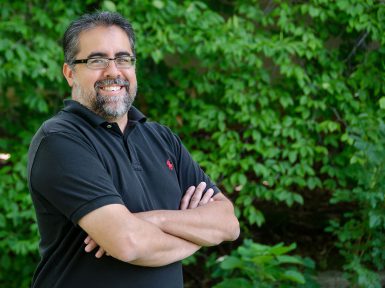Revamped M.S. journalism concentration will focus on investigative reporting
Journalism faculty had been discussing for years how to revamp The Media School’s Master of Science journalism concentration.
When the establishment of the Michael I. Arnolt Center for Investigative Journalism was announced earlier this year, they finally knew what to do. The center was a game changer, said associate professor Gerry Lanosga.

“We knew we wanted graduate students involved,” he said.
Starting in fall 2019, the concentration — one of four offered in the professional master’s degree — will focus on investigative journalism. Students will complete nearly half of their credits through work in the investigative center.
The Arnolt Center, funded by a $6 million gift from journalism alumnus Michael Arnolt, BA’67, will facilitate student-produced multimedia investigative journalism on issues of importance to the residents of Indiana. The Media School announced the establishment of the editorially independent center in September.
The degree will remain a 30-credit, two-year program. Many of the courses will remain the same, but some new ones will be added.
At least 12 credits will be completed through work in the Arnolt Center. Lanosga said journalism M.S. students will spend about nine to 12 hours a week working in the center. During that time, students will work on long- and short-term projects, file Freedom of Information Act requests, make phone calls and research data.

“My hope is that students will be able to leave with skills they need and a broader understanding of what investigative journalism means,” said Andrew Weaver, director of graduate studies at The Media School.
The center will give students a place to publish work that will have a real impact in the world. Having a strong portfolio of published work is what gets people jobs after graduation, Weaver said.
“But it’s not just the end goal of getting a job,” Weaver said. “The hope is that students make a difference here in the Bloomington community.”
Although all students will complete a prescribed cluster of core classes, including an investigative journalism course, the degree will remain customizable, Lanosga said. If students enter the program with a desired skillset or a specific interest, they can take classes on that topic or skill.
The Media School already excels at teaching writing, but Lanosga hopes the new center and concentration emphasis will lead to an increased focus on reporting.
“Reporting has to come first,” he said.

Investigative journalism is experiencing a resurgence, Lanosga said. While he thinks all reporters should be investigative, there are some skills that only investigative journalists have.
It’s important for aspiring journalists to have the opportunity to study and practice those skills in an academic setting, he added.
Weaver said the revised program will admit roughly the same number of students. The type of applicant the faculty is looking for, however, might change slightly. They’ll look for candidates who have a specific interest in investigative journalism.
The investigative focus will still serve students who might not want to be an investigative reporter, Lanosga said.
“Investigative skills will serve anyone who wants to end up in journalism, or not,” he said.
The application deadline for fall 2019 is Jan. 15. Current IU students interested in pursuing any Media School graduate degree can learn more at an information session at 7 p.m. Thursday in Franklin Hall 312.
More:

